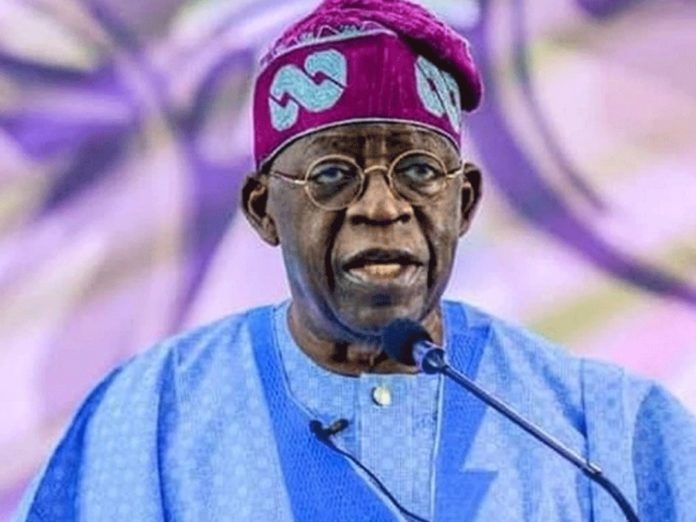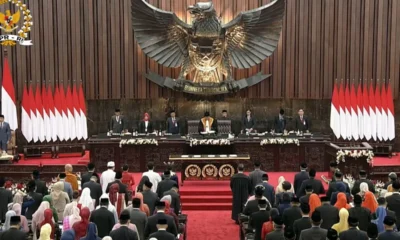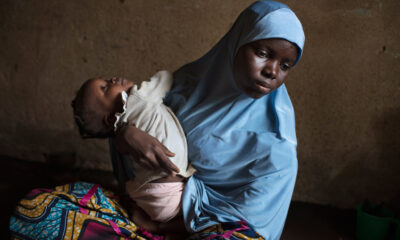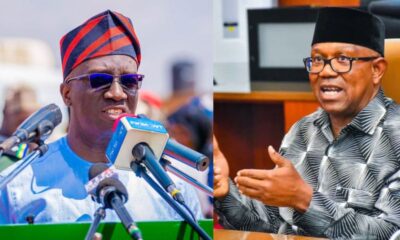Africa
Why President Tinibu Deserves Second Term (2) -By Jabir T Usman
As citizens, our duty is to support good leadership when we see it. The achievements of President Tinibu in just two years are proof that he is not only capable but deserving of another mandate. With patience, unity, and collective resolve, Nigerians will continue to reap the dividends of his Renewed Hope Agenda.

As a patriotic Nigerian who has always dreamt of a united and prosperous country, regardless of tribe or religion, i consider it a duty to use this platform to shed light on the stewardship of President Bola Ahmed Tinibu within his first two years in office. The hallmark of good leadership lies in tangible achievements, and in this regard, the president has shown remarkable progress in areas of the economy, healthcare, agriculture, security, education, and infrastructure.
Unfortunately, some tribal bigots and reactionary elements have tried to sow division by distorting facts and misinforming citizens about the genuine progress this government has recorded. Such voices thrive on sectionalism rather than truth. But the records of Tinibu’s administration speak for themselves, and it is important that Nigerians are reminded of the progress made under the “Renewed Hope Agenda.”
On the economy, President Tinibu’s leadership has revived critical institutions to stimulate human capital development. The National Directorate of Employment (NDE), which was abandoned for years, has been revitalized. It now empowers job seekers through skill acquisition, vocational training, and entrepreneurship support. Beneficiaries are not only trained but also provided stipends and starter packs to ease their transition into self-reliance. This is a practical approach to fighting unemployment.
Equally significant is the administration’s success in stabilizing the economy after years of uncertainty. GDP growth has begun to recover, and inflation, though still a challenge, has shown signs of decline due to deliberate fiscal and monetary reforms. Investments in digital economy and support for start-ups are opening new doors for young Nigerians eager to make an impact in the global economy.
President Tinibu has also prioritized financial inclusion, bringing millions of Nigerians into the formal banking sector through expanded digital payment platforms. This enhances accountability and ensures that government intervention programs reach the real beneficiaries without leakages.
In the health sector, Tinibu’s resolve has been exemplary. Within months of assuming office, he convened state governors, partners, and stakeholders to sign the Health Sector Renewal Compact. This bold step underscored his determination to reposition healthcare delivery as a service accessible to all Nigerians, not just the privileged few.
The relaunch of the National Emergency Medical Services and Ambulance System (NEMSAS) further underscores his vision. With NEMSAS, patients are guaranteed free ambulance services and medical care within the first 48 hours of emergency admission. This initiative saves lives daily and reflects a government that values its people’s health above all else.
Another milestone in healthcare is the expansion of cancer treatment centers across the country. Previously, Nigerians had to travel abroad or endure long waiting lists for specialized care. Under Tinibu, the establishment and equipping of new cancer centers bring hope to patients and reduce medical tourism.
Agriculture has equally benefitted from Tinibu’s foresight. His administration injected N130 billion into the National Agricultural Development Fund to boost food production and diversify the economy. This intervention is easing the burden on farmers and ensuring food security amid global uncertainties.
The creation of the Ministry of Livestock Development is another landmark move. For decades, pastoral challenges have contributed to conflicts and food crises. By institutionalizing livestock development, Tinibu has provided a roadmap for modern ranching, animal husbandry, and peaceful coexistence between farmers and herders.
In the area of infrastructure, the establishment of the Renewed Hope Infrastructure Development Fund (RHIDF) in 2024 was a bold masterstroke. With a take-off seed of about N20 trillion, the fund is already driving massive investments in roads, railways, aviation, agriculture, energy, and healthcare facilities. Early signs of these projects can already be seen in pilot states across the federation.
Security, one of Nigeria’s most pressing challenges, has received unprecedented attention under Tinubu. His directive for a unified national security strategy has fostered synergy among the Army, Air Force, Navy, Police, DSS, Civil Defence, and local vigilante groups. Coordination under the National Security Adviser, Malam Nuhu Ribadu, has strengthened intelligence-sharing and rapid response to threats.
Communities once terrorized by bandits in the Northwest are beginning to experience stability, thanks to coordinated operations that have neutralized notorious bandit leaders. The recent arrest of two prominent insurgent militant leaders is highly commendable both within Nigeria and the international communities, Mahmud Muhammad Usman (also known as Abu Bara’a, occasionally referred to as Abbas or Mukhtar), he was the self-styled Emir (leader) of the Ansaru terrorist group, an Al-Qaeda-linked splinter faction of Boko Haram. And Mahmud al-Nigeri (also known as Mallam Mamuda), he was the Chief of Staff (Deputy) of Ansaru and leader of the so-called “Mahmudawa” cell, operating around Kainji National Park and across borders with Niger and Benin. Citizens are gradually regaining confidence, as civil-security relations improve under this collaborative framework.
The fight against terrorism and insurgency in the Northeast has also recorded progress. Strategic planning and consistent resolve have weakened extremist groups, allowing displaced persons to return to their communities. The administration’s commitment to rebuilding these communities further demonstrates Tinibu’s compassion for the people.
On education, Tinibu has expanded opportunities for Nigerian youths by approving licenses for new private universities and establishing additional federal institutions. This is helping to absorb the ever-increasing number of admission seekers and reduce pressure on public universities.
Equally commendable is the administration’s investment in technical and vocational education. By strengthening polytechnics, colleges of education, and specialized training centers, the government is ensuring that not all Nigerian youths must depend on white-collar jobs. This holistic approach to education directly complements the revived NDE.
President Tinubu’s leadership has also redefined Nigeria’s foreign relations. His active participation in ECOWAS, African Union, and global forums has positioned Nigeria as a voice of reason, peace, and economic opportunity. His government has fostered new bilateral agreements aimed at attracting foreign investment and technology transfer.
In just two years, Tinibu has set the foundation for a more prosperous Nigeria. His administration has balanced economic reforms with social interventions, security with freedom, and infrastructure with human capital development. These are not promises on paper; they are visible realities Nigerians are witnessing daily.
It is therefore imperative for Nigerians to look beyond the noise of cynics who only see through the lens of tribe or religion. The truth is that Tinibu’s administration has delivered milestones that justify continuity. A second term in 2027 would consolidate these gains and accelerate Nigeria’s journey toward greatness.
As citizens, our duty is to support good leadership when we see it. The achievements of President Tinibu in just two years are proof that he is not only capable but deserving of another mandate. With patience, unity, and collective resolve, Nigerians will continue to reap the dividends of his Renewed Hope Agenda.
Jabir T Usman writes from Sabon Gari Tudun Wada, Kaduna


























